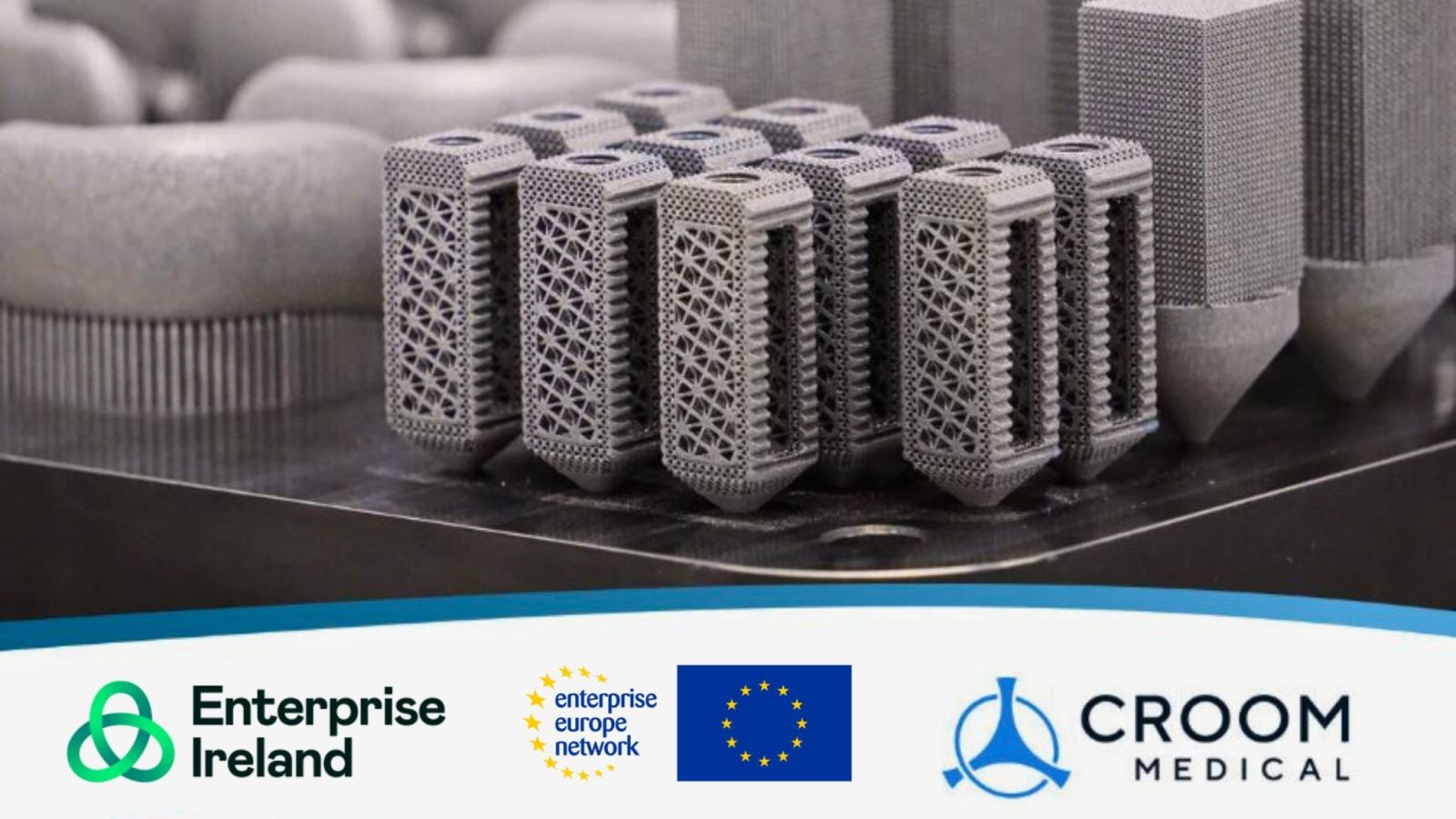
10 July 2024
Additive manufacturing (AM), commonly known as 3D printing, has revolutionised the engineering landscape by facilitating faster prototyping, reducing manufacturing costs and improving product quality. It has also transformed the future of orthopaedic treatments, offering customised implants tailored to each patient’s anatomy.
At the forefront of this transformative wave is Croom Medical, a leading Irish orthopaedic manufacturing company that uses the latest machinery, technologies and materials to deliver high-quality implants for original equipment manufacturers (OEMs) globally.
Croom’s journey traces back to its founder, Patrick Byrnes, a visionary engineer and dedicated artisan. He launched Croom Medical in 1984. Initially focusing on precision engineering and tooling, Byrnes redirected the company’s course towards medical device innovation in 1995, foreseeing the growing demand for specialised and high-quality orthopaedic implants.
This strategic shift was driven by the recognition of unique opportunities within the medical devices sector, particularly in orthopaedics, where innovation and quality manufacturing were paramount. The company’s expertise in precision engineering provided a robust foundation for this transition, enabling it to apply its technical capabilities towards developing and manufacturing complex medical devices.
Greater competitiveness in the device industry was essential for the company’s sales growth.
Addressing these challenges in competitiveness was Enterprise Europe Network Ireland. It enabled Croom Medical to successfully pivot into the medical device sector. The company is now a leading provider of orthopaedic implants and medical device innovation, collaborating with multinational OEMs worldwide.
"We’re here to help our customers secure their supply chain, improve product quality and advance their innovation," said Patrick Byrnes, CEO of Croom Medical.
Enterprise Europe Network played a central role by introducing Croom Medical to the Irish Manufacturing Research (IMR), the centre which was in the process of developing a Eureka application in the field of AM.
IMR struggled to find a medical device business that could direct, create, and test the application. Croom Medical’s goal included growing into the AM market, making this project an excellent opportunity for the company to participate in.
As an independent research technology organisation, IMR supports the Irish manufacturing sector in capitalising on the opportunities offered by new technology and overcoming threats presented to their industries. Its vision is to enable manufacturing of all sectors and sizes to be leaders in the world of advanced manufacturing so that they can compete and thrive in the global economy.
IMR also supports industry to deliver emerging technologies for manufacturing under the core thematic areas of digitisation, robotics and automation, design for manufacturing, and sustainable manufacturing.
"I mentioned the project to Patrick at Croom Medical and he was very interested in hearing more about the project. I also introduced him to the team at IMR who were preparing the application. After a number of conversations with the team in IMR and the wider Eureka application team, it was agreed that Croom Medical would be invited onto the application," said Network technology expert, Ann Dooley.
The proposal was submitted and approved at the Eureka level. Significant work was needed from both the company and the IMR/I-Form Advanced Manufacturing Research Centre to secure national funding for the programme. The I-Form Centre, headquartered at the University College Dublin’s School of Mechanical & Materials Engineering, focuses on advancing the understanding, development, and control of complex materials processing technologies, particularly in AM, within the digitalisation of manufacturing.
Enterprise Europe Network Ireland assisted the Irish consortium in preparing applications for national funding, as well as presenting both projects to a committee for funding, which was successful. Moreover, Enterprise Europe Network Ireland also supervised the funded project during the course of the work.
The overall goal of the Eureka programme was to achieve a step change in the quality and yield of components produced by metal AM and, as a result, deliver enhanced cost competitiveness.
This involved developing a deeper understanding of design for AM and its correlation with material properties, as well as simulation techniques. It also fostered wider adoption of advanced in-process monitoring technologies in AM and leveraged these advancements to craft tailored post-processing AM techniques.
Enterprise Europe Network Ireland supported Croom Medical in their participation in the Eureka programme.
Success led to a 5 % annual market share increase (equal to an additional turnover of EUR 250 000 annually) and the recruitment of two AM specialists. Croom Medical’s competitive edge in AM for the medical device sector was significantly enhanced.
"Advancements in additive manufacturing significantly bolstered our market position by enabling us to offer more innovative and customised solutions in the orthopaedic implant sector," noted Byrnes.
In addition to customisation and personalisation, Croom Medical developed an enhanced rapid prototyping capability for components with complex geometries and porous structures. Cost and material efficiencies were achieved in small batch production, along with enhanced product performance.
"The efficiency and flexibility of AM have shortened our time-to-market for new products. Being able to quickly respond to emerging trends or clinical needs with innovative solutions has strengthened our competitive advantage," explained Byrnes. Overall, Croom’s story is one of perseverance, innovation and dedication to excellence in the pursuit of making a difference in orthopaedic care.